Despite the tight time constraints of the election campaign, the formation of district election commissions and beginning of their activities were accompanied by the certain difficulties, although within the effective legislation and calendar plan. Within the established time limits, the CEC has created and maximally used its powers to regulate electoral issues, caused by military aggression of the Russian Federation towards Ukraine. The CEC has taken a justified decision regarding impossibility to create the DECs on occupied territories (the ARC and Sevastopol), because neither candidates for the President of Ukraine, nor the Chairman of the Verkhovna Rada of AR Crimea, nor the Head of Sevastopol City Council have submitted the candidacies for DECs in districts #1-10, 224, and 225. In other Ukrainian regions, the CEC has created district election commissions and all of them have started functioning.
As usual, the attendance during first meetings of DECs was quite low. Almost one fourth part of all members was absent, what is the sign of possible rotations in membership of district election commissions. Besides that, a large number of DECs' members don't live in districts where they are supposed to work, but live in other raions and oblasts. Therefore, most of them won't be able to participate in activities of DECs regularly, and will be substituted.
Another topical issue is providing information about meetings of DECs to the public. There is no public information about the time and place of meetings. Such situation creates the certain difficulties for civic observers and mass media representatives, who need to provide timely and unbiased information about the election observers to the voters. Moreover, observers have reported that journalists and representatives of electoral institutions pay little attention to first meetings of DECs, especially in south-eastern oblasts of Ukraine. Apparently, it's due to the military aggression of the RF in Ukraine.
There were no major conflicts or contradictions between members of DECs during first meetings of district election commissions. However, the situation outside the DECs remains hazardous and conflicting, and can directly influence the work of election commissions. As long as pro-Russian forces and terroristic movements are aimed to disrupt the election process in Ukraine, election commissions may be targets for their activities.
Submission of candidacies and creation of DECs
The deadline for nomination of candidates for membership in district election commissions was April 9. Every of 23 candidates for the President of Ukraine, registered by the CEC, could nominate one member to every election commission (Article 23(3) of the Law of Ukraine on Election of the President of Ukraine). The effective Law didn't set any limits for the maximum number of members in every DEC. Therefore, all presidential candidates, who have submitted to corresponding documents, have got their representatives in DECs. The procedure of drawing lots, which is traditionally used during other types of elections, wasn't used during this snap election of the President. In such a way, technical manipulations were impossible on the formation stage, and the representation of candidates in membership of DECs is balanced.
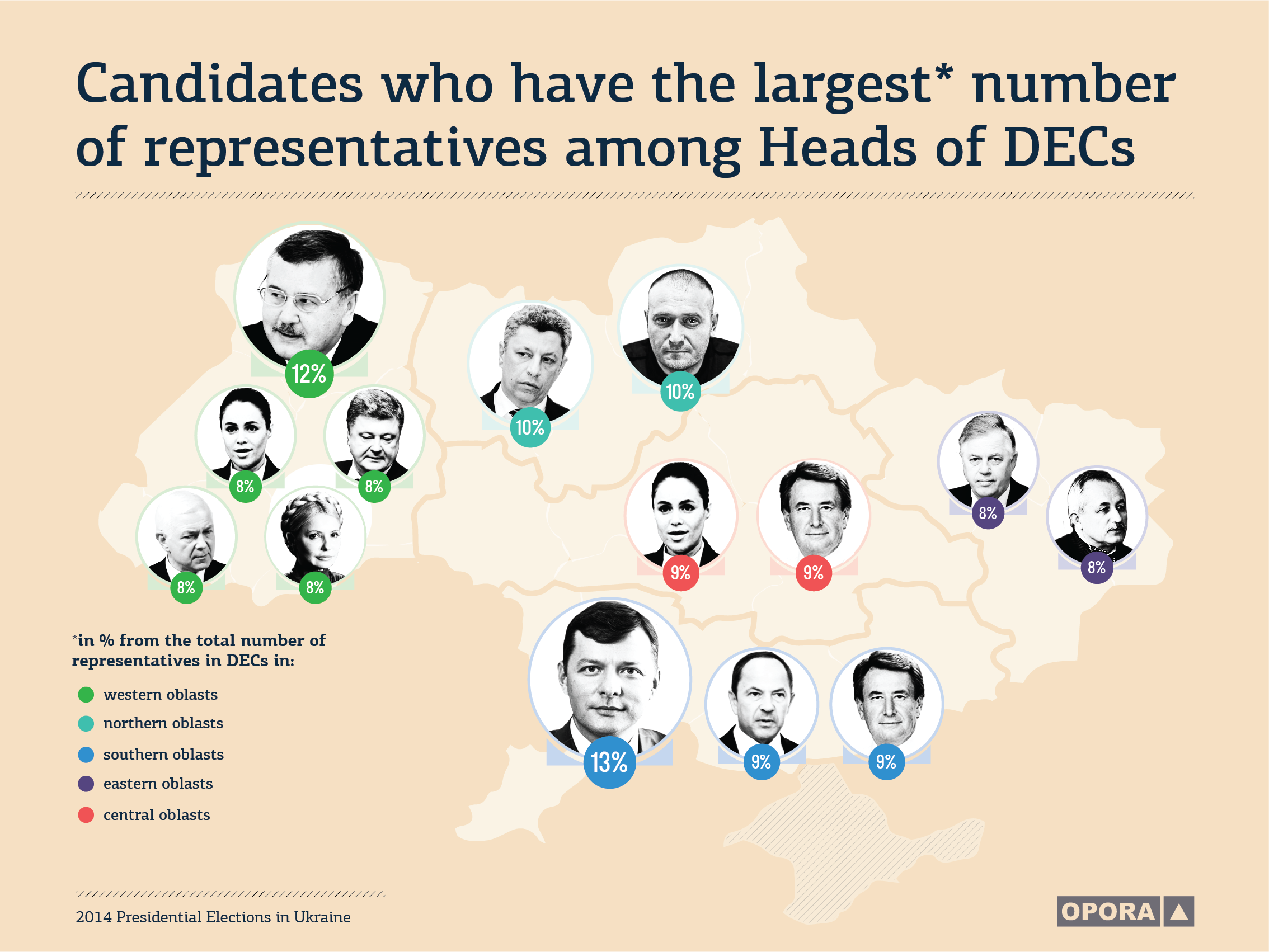
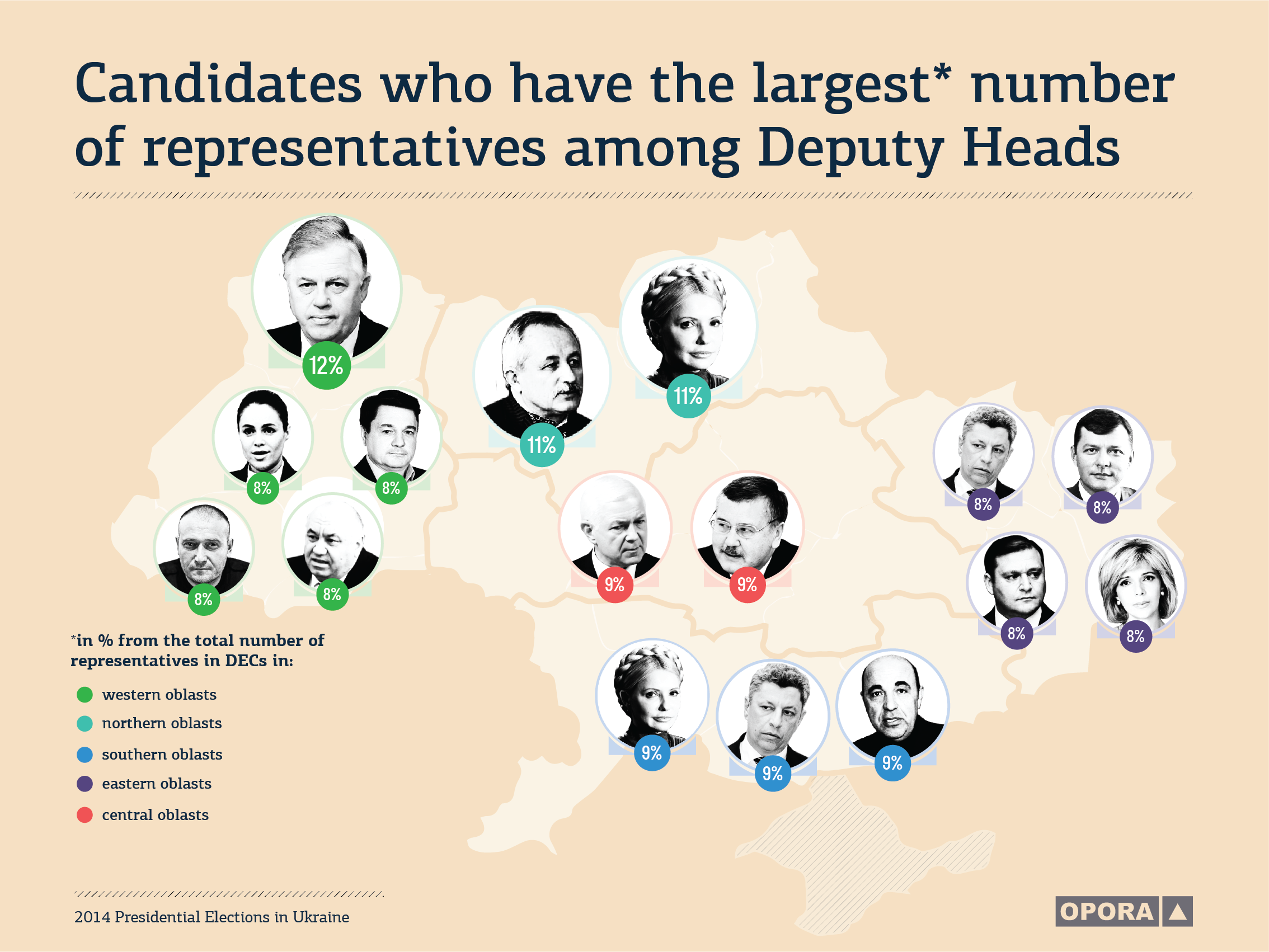
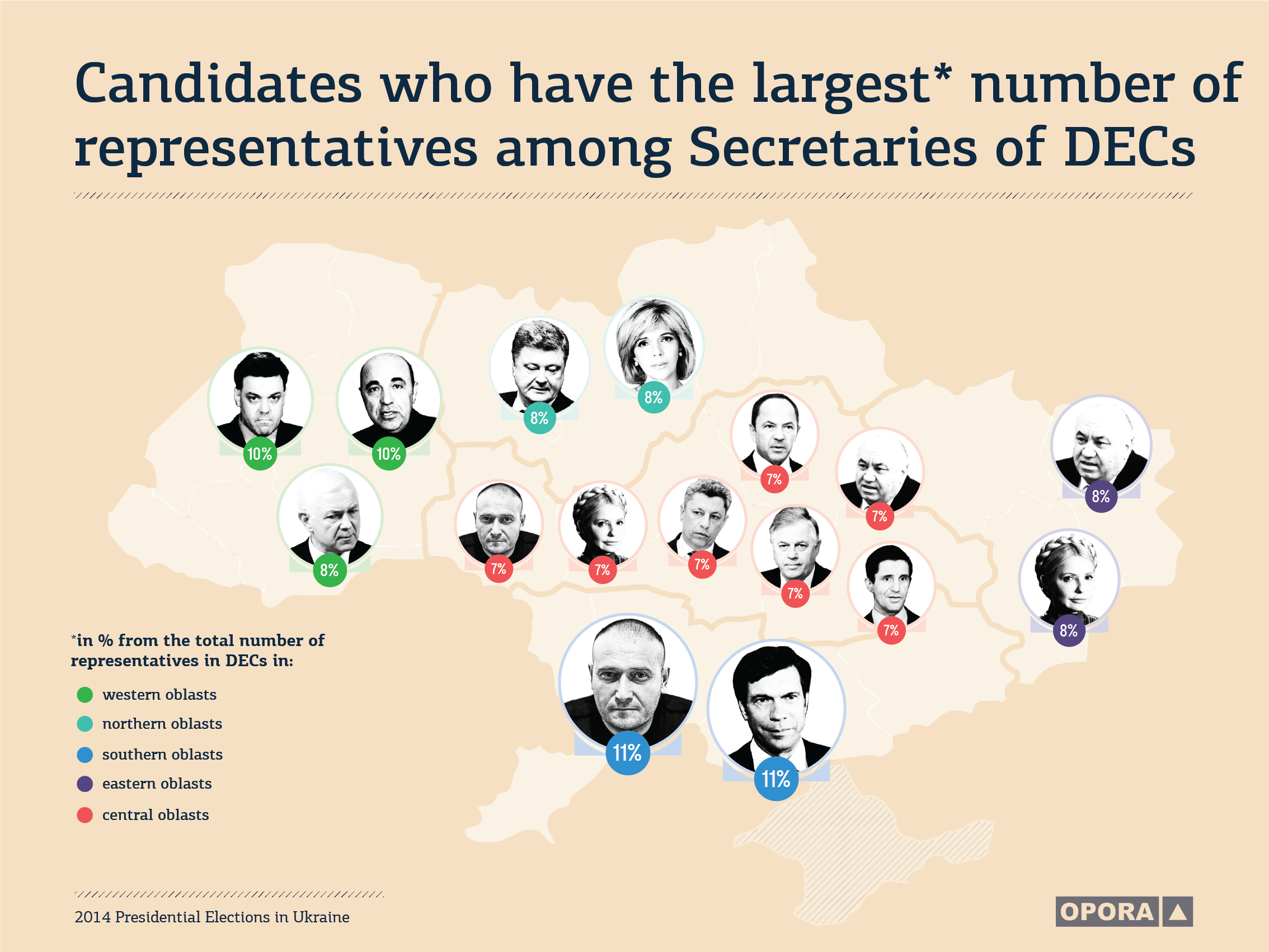
The military aggression of the Russian Federation and seizure of the AR Crimea are destabilizing for the course of election campaign in Ukraine. Taking into consideration that life and health of Ukrainian citizens in Crimea are directly endangered by the RF, none of Presidential candidates has nominated candidates for the membership of district election commissions in districts #1-10, 224 (the Autonomous Republic of Crimea), and 225 (Sevastopol). Therefore, the CEC has appealed to the Head of the Verkhovna Rada of Crimea, and the Head of Sevastopol City Council with a request to propose candidates for the membership of the corresponding DECs, and provide the premises for their functioning. Due to the absence of answer, and impossibility to fulfill established by the Law duties regarding the preparation and conduct of presidential election, the CEC has passed the Resolution on Impossibility of creation of district election commissions for election of the President of Ukraine in territorial election districts #1-10, 224, and 225 during the special election of the President of Ukraine scheduled for 25 May, 2014.
Thus, having considered the submissions from candidates for the President of Ukraine, registered by the CEC, regarding nomination of candidatures for the membership in district election commissions for election of the President of Ukraine, the CEC has created 2013 district election commissions for election of the President of Ukraine during the special election of the President of Ukraine scheduled for 25 May, 2014.
21 presidential candidates have nominated candidates for the membership in DECs. Two candidates (Andrii Hrynenko and Valerii Konovaliuk) haven't delegated any representative to the membership of DECs, and will not have possibilities to directly influence the preparation and organization of elections. Most of them have their representatives in all 213 district election commissions or almost in all (210 or 212). However, five presidential candidates have delegated their representatives in DECs only to some regions and districts. For example, Oleh Tsariov hasn't submitted any representatives for DECs in western Ukrainian oblasts (Volyn, Lviv, Zakarpattia, Ivano-Frankivsk, Ternopil, and Khmelnytsk). Mykhalo Dobkin, for his part, doesn't have any representatives in DECs located in Kyiv, Lviv, and Rivne oblasts.
However, all the candidates have received the quota of managing positions in membership of DECs, proportional to the number of submitted representatives. They were distributed with the help of an information analytical system "Vybory" (Elections). Candidates O. Bohomolets, Yu. Boiko, A. Hrytsenko, O. Klymenko, N. Korolevska, V. Kuibida, O. Liashko, P. Poroshenko, P. Symonenko, Yu. Tymoshenko, O. Tiahnybok, V. Tsushko, Z. Shkiriak and D. Yarosh. have thelargest number of heads in DECs. In general, O. Liashko, P. Poroshenko, Yu. Tymoshenko, V. Tsushko ta D. Yarosh.O. Liashko, P. Poroshenko, Yu. Tymoshenko, V. Tsushko, and D. Yarosh. have the largest number of officials (heads, deputy heads, and secretaries).
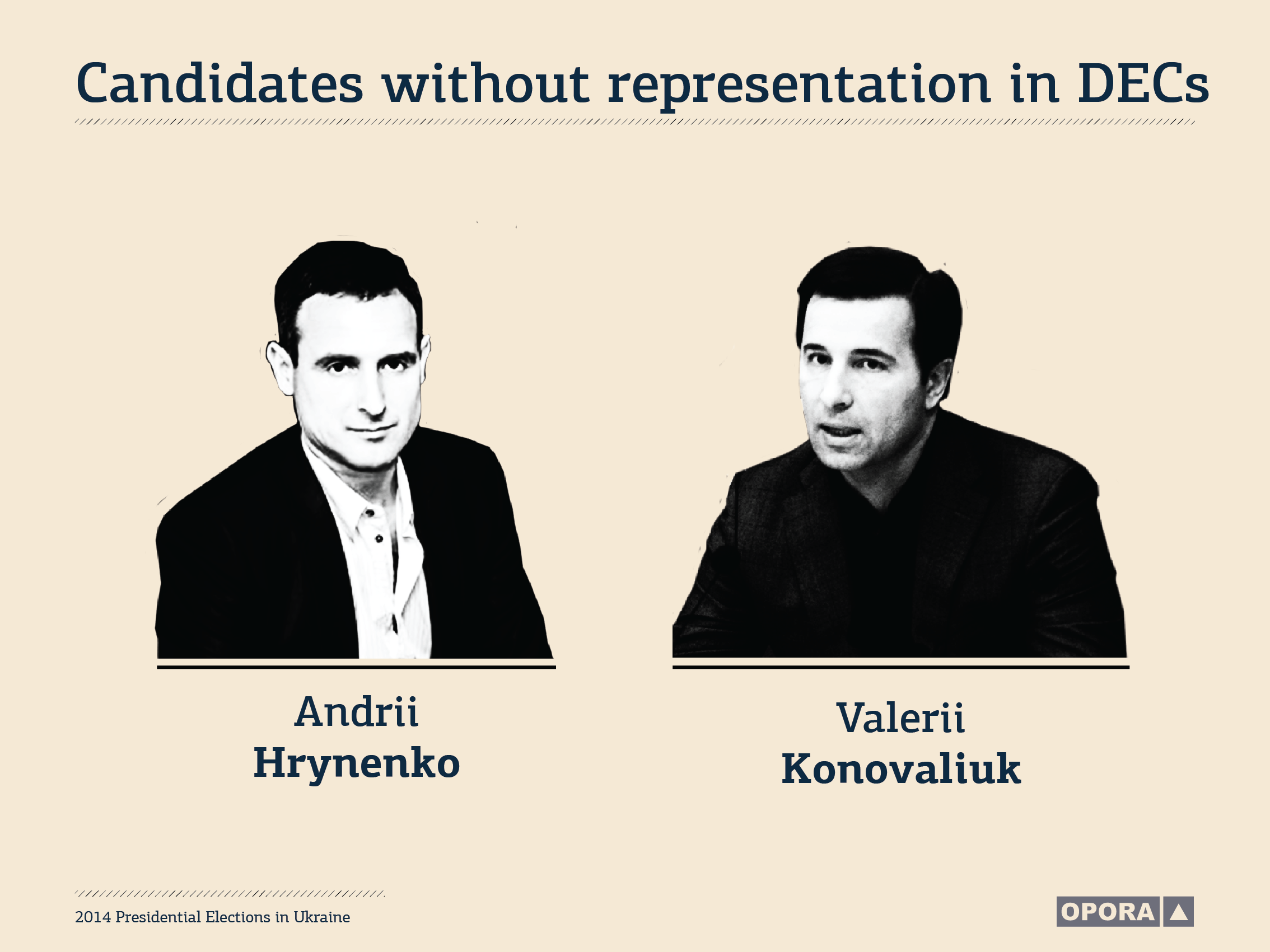
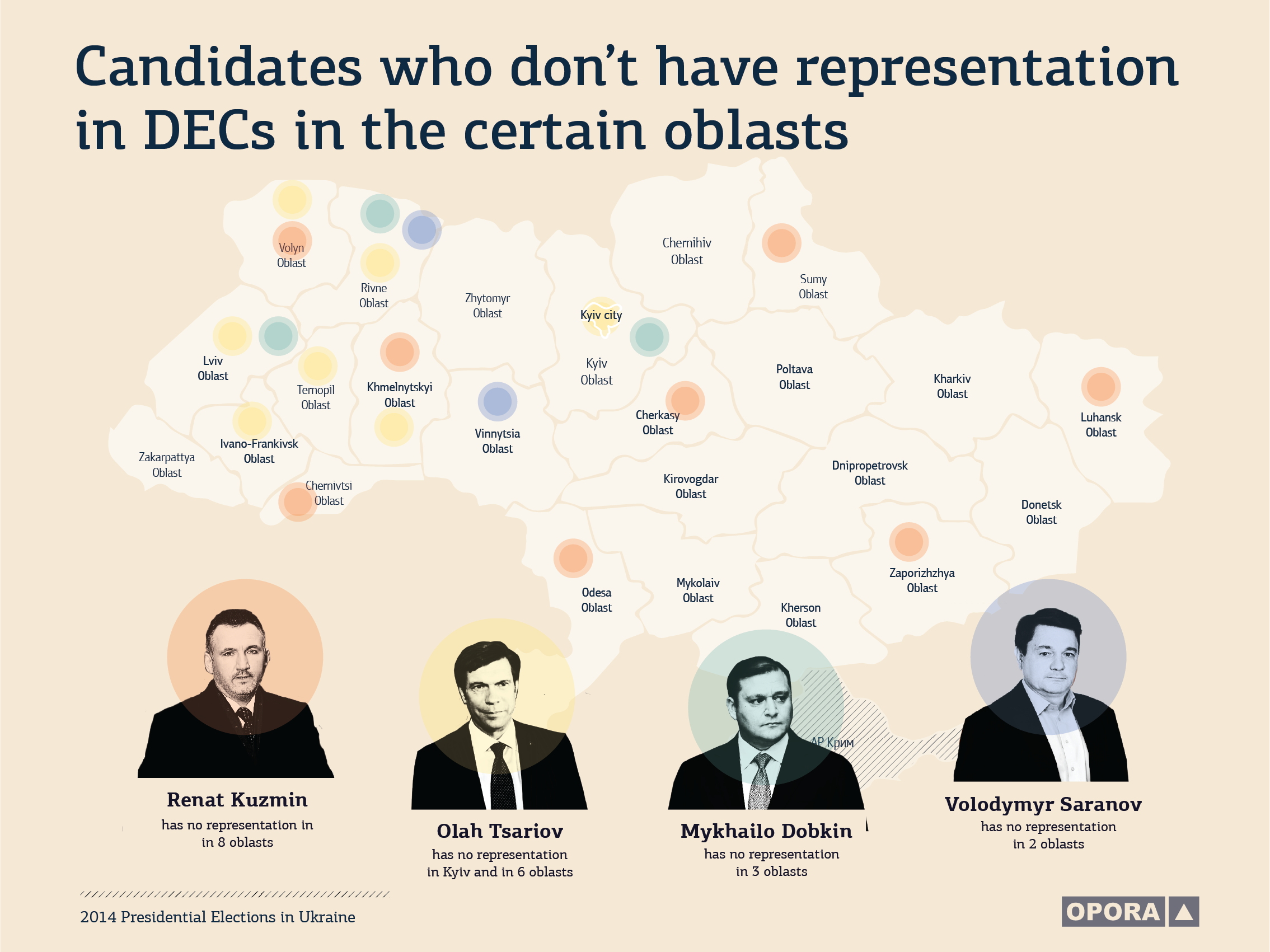
The membership of 26 DECs is maximal (21 persons), but there are no commissions with minimal membership (12 persons). Election commission in district #155 (downtown of Hoshcha, Rivne oblast). 4 DECs were created with the membership of 17 persons.
The total number of people in district election commissions is 4,164. 52% of them are men, and 48% - women. Almost 67% of members have already worked in election commissions before. During 2010 Presidential elections, this number was 95.5%. On one side, the number of members of DECs who have received the higher education has decreased from 93% in 2010 to 83% in 2014. On the other side, the number of young people in DECs has increased. There are almost fourth part (23%) of people under 30 years old, compared to 13% in 2010 and 11% in 2014.
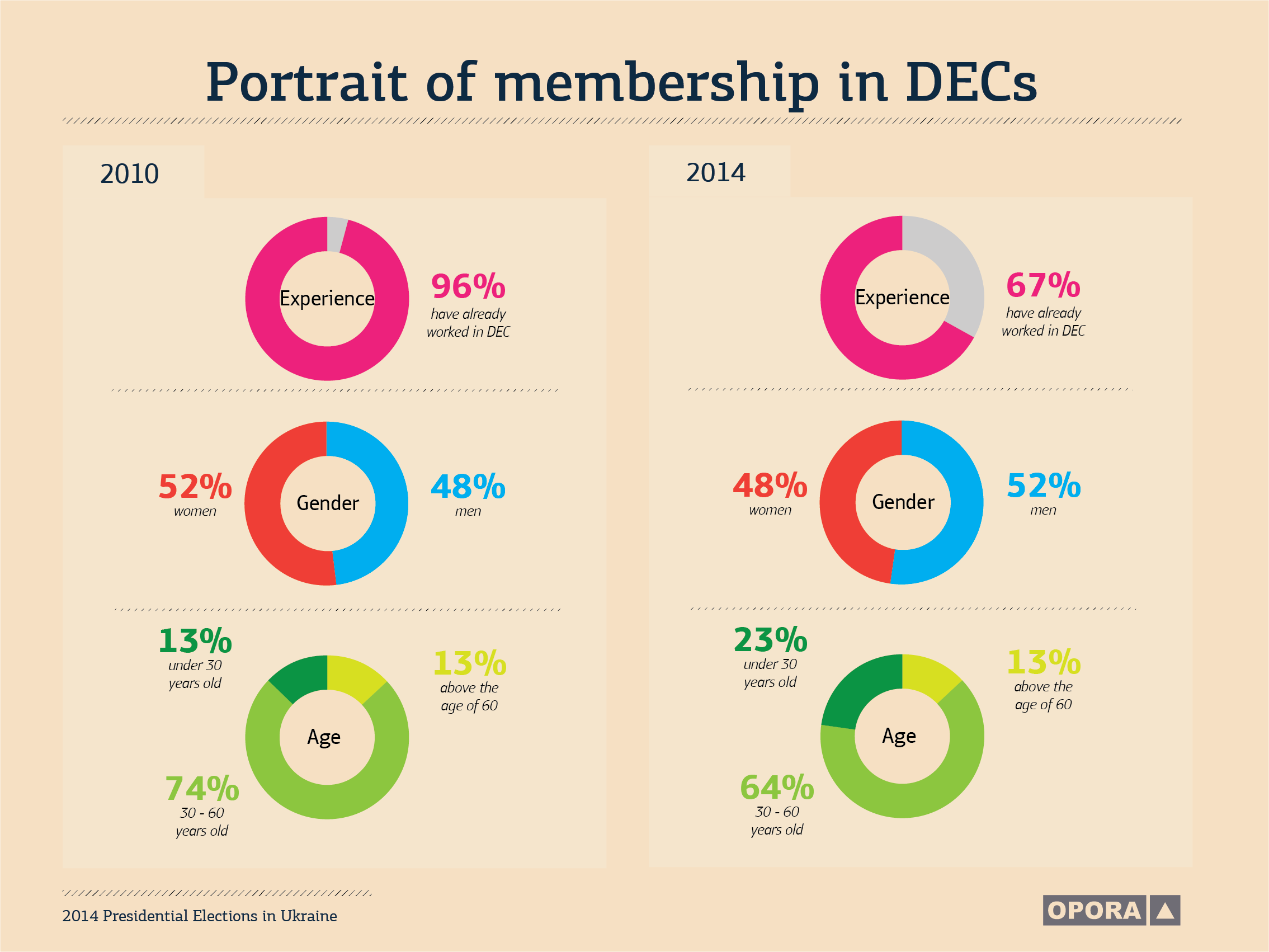
First meetings of DECs
Since the official creation of district election commissions by the CEC (April 14), they had only 2 days to hold their first meetings. During these meetings, members of DECs were supposed to take an oat (by at least two thirds of the membership), to make the commissions authorized.
Most of DECs have conducted their constituent meetings in time, predominantly on 16 April 2014. However, due to the absence of quorum and impossibility to take an oath by less than two thirds of the membership, some commissions have conducted their first meetings only after the second or third attempt. For example, the following district election commissions didn't manage to get the quorum from the first attempt: #202 (Cherkasy oblast), #49, #50, #53, #62 (Donetsk oblast), #102 (Kirovohrad oblast), #115, #116, #117 (Luhansk oblast), #124 (Lviv oblast), #131 (Mykolaiv oblast), #12, #13, #15 (Vinnytsia oblast), #23 (Volyn region).
Due to the fact that city of Sloviansk was seized by pro-Russian forces, the meeting of the DEC #47 wasn't held.
Heads of district commissions called every member to inform about the first meeting (contact information was provided by the CEC). However, almost every commission had individuals, whose numbers were invalid, or not answering. Thus, two-three persons from every commission were not informed about the first meeting.
Most of commissions didn't manage to gather in full membership for the first meeting. In general, from 2 to 8 persons were absent. More than 1,094 persons didn't come to first meetings of DECs. It's more than 26% of total number of members registered in election commissions. Efficient of commissions was even complicated by the absence of heads, deputy heads, or secretaries of DECs on the first meetings.[1].
First meetings of DECs were mostly ignored by representatives of Oleh Tsariov (119 persons), Vasyl Tsuksha (110 persons), Volodymyr Saranov (109 persons), Vadym Rabinovych (89 persons), and Dmytro Yarosh (82 persons). On the contrary, the most disciplined members of DECs are from Yuliia Tymoshenko (8 absent on first meetings), Petro Poroshenko and Oleh Tiahnybok (15 absent), Mykhailo Dobkin and Petro Symonenko (16 absent each).
The main of absence were: 1) impossibility to contact by phone; 2) no willingness to come to commission meetings because they live in different oblasts. Observers of the Civil Network OPORA have calculated that at least 304 (7% of the total number) members of DECs were living in other oblasts when they were delegated. Such members were often from Kyiv city, and Kyiv, Dnipropetrovsk and Lviv oblasts.
Moreover, commission members often affirmed that they didn't write any applications, and that their presence in membership of the commission is a mistake. More than 150 persons, who became members of the commissions have immediately refused to work there[2] .
Presence of other persons on meetings of DECs
According to the Article 28(9) of the corresponding Law, the following individuals have the right to attends meetings of election commissions without any permits or invitations: candidates for the President; their authorized person (not more than one authorized person from one candidate); official observers from candidates, parties participating in the election process, or non-governmental organizations (not more than two persons from every candidate, party, organization); official observers from foreign states and international organizations; mass media representatives (not more than two persons from one mass media company). All the other individuals can attend commission meetings only after receiving a permit or invitation from this commission. The decision to issue permit or invitation is taken during commission meeting.
Authorized persons of candidates visited first meetings of DECs, but not very actively. Attention of the mass media representatives was also quite low. The most active visitors of first meetings of DECs were authorized persons of Yuliia Tymoshenko and Petro Poroshenko. Observers haven't reported any incidents of illegal non-admission of persons to meetings of DECs.
Representatives of local authorities and local self-government bodies visited first meetings of DECs quite willingly. Usually, they were employees of executive bodies, responsible for material and technical support of the election process, or people from law enforcement agencies. The commissions usually didn't take any decisions regarding the possibility of their participation in their meetings. For example, the Chief of Staff of Kharkiv RSA Zinaida Vasylivna Anikeitseva, and Deputy Head of Kharkiv Raion Council Viktor Ivanovych Nikulenko were present during the first meeting of the DEC #183. However, any decision regarding submission of permit for their presence were not taken. Executive committee administrator of Bilhorod-Dnistrovskyi City Council Yurii Vsevolodovych Khrypko was present on the meeting of DEC #143 (city of Bilhorod-Dnistrovskyi). The Commission didn't vote for submission of permit for his presence. The Chief of Staff of Novoselytska RSA provided information about technical support for the commission during meeting of the DEC #206. However, there was no voting regarding his presence.
Besides local officials, people, whose functions were unknown for all commission members, were often present on meetings of DECs. Thus, a lawyer of the AUU Batkivshchyna was present during the meeting of the DEC #206 (Chernivtsi oblast), but there was no voting regarding his presence. A system administrator, who was not member of DEC, was present during the meeting of DEC #192. The Commission didn't vote for submission of permit for his presence during the meeting.
Besides that, some misunderstanding appeared during meetings of commissions, caused by participation of individuals, who were supposed to substitute the current (but absent) commission members, but didn't have the corresponding resolutions of the CEC, or other formal confirmations of their status.
One of such conflicts occurred in Kyiv oblast. Local activists of Obukhiv raion have prepared an appeal regarding vote of non-confidence to the Head of the DEC #95, Andrii Viktorovych Tkachenko, and demanded that he wrote a resignation letter. However, Mr. Tkachenko refused to write a letter of resignation, and tried to leave the premises, where the DEC was holding its meeting. Representatives of local Self-defense and the Right Sector have blocked the exit, and demanded to sign the protocol and resolution of the DEC #95, regarding the voting on the vote of non-confidence to the Head of the DEC, supported by the majority of commission members (14 persons). After the corresponding protocol and resolution were prepared, A. Tkachenko has signed the documents.
During the meeting of the DEC #201 (centered in city of Smila), local activists, interested in activities and membership of the DEC, have gathered near its premises. They affirmed that they intend to watch the activities of the DEC, and inform official observers about the openness and transparency of the commission, as well as about any violations of electoral legislation.
During the meeting of the DEC #203 (centered in city of Uman), a commission member N.S. Tulchynska (from O.Ya. Tiahnybok) proposed to ask the local Self-defense to guard the commission The Commission has unanimously supported this proposition.
Material and technical support of DECs
On the stage when the DECs have only started their activities, the issue of material and technical support is not regulated at all. In fact, there are no information boards to hang official materials of commission, phones and internet are not connected, there are no signboards with names of DECs. The DECs have no computers, stationery, or cars. Some premises do not correspond to requirements of the CEC – are smaller than 80 square m. (for example the DEC #183, #86).
There were incidents, when the first meetings were conducted in other premises than those indicated on official website of the CEC. This was usually explained by the fact that premises, which addresses were indicated on website of the CEC, didn't correspond to technical requirements, or were unsuited for efficient work of commissions. Some DECs in south-eastern Ukraine had to change their premises due to the military conflicts, incited by pro-Russian criminal groups. In particular, the DEC #48 held its meeting at another address because the premises of Kramatorsk City Council were seized. After the premises of Yenakiievo City Council were seized, the DEC #53 took a decision to conduct its meeting in children's library. The commissions #52 and #60 have also changed their premises.
About the observation in short
Within the monitoring campaign, OPORA attracts observers in every Ukrainian oblast to the conduction of long- and short-term observation during snap Presidential election, interim Parliamentary elections (district #83), and special local elections. In 2014, the course of election campaign from official start to the announcement of winners will be analyzed by 190 long-term observers. Two thousand of short-term observers will join them on the election day (in every round). Besides that, OPORA will deploy 500 short-term observers on May 25 in Kyiv. On the basis of gathered data, OPORA will prepare interim reports on commission activities, nomination of candidates, campaigning, the use of administrative resource, vote count etc. Besides that, the organization will publish results of sample-based parallel vote tabulation (PVT or quick count), which is representative and has small margin of error, in compared to other types of research. The PVT will be conducted during Presidential election and local elections in the capital (election of Kyiv city mayor, and of members to local council by party lists).
OPORA successfully implements modern observation methods and instruments, and uses innovative means to disseminate observation results – infographics and an interactive map of violations. During the election day, the organization conducts sample-based quick count. This method is based on voting results, gathered on polling stations, picked by statistical sampling. OPORA's observers are staying at polling stations, and systematically provide information about turnout, violations, and voting results to the central database.
All summaries are based on generally recognized principles and requirements for the organization and conduct of the democratic elections. These standards are represented in the Venice Commission Code of Good Practice in electoral matters, Copenhagen Documents, Commitments for Democratic Elections in OSCE Participating States.
In 2014, OPORA will secure the functioning of 2 unique web-resources: remote training course for civic activists, journalists and observers, as well as the map of violations which visualizes the course of election campaign in Ukraine. The training component will secure all practical needs of citizens and international missions securing observation during the campaign, and map of violations will help to systematize the information about violations.
[1] The absence of members of DECs holding managing positions were reported in: Cherkasy oblast - DECs # 198, 201, 202, 203; Chernihiv oblast - DECs # 209, 211, 212, 213; Chernivtsi oblast - DECs # 204, 205, 207; Dnipropetrovsk oblast - DECs # 25, 26, 28, 29, 34, 36, 37; Donetsk oblast - DECs # 42, 43, 44, 49, 51, 52, 56, 58, 59, 60, 62; Ivano -Frankivsk oblast - DEC #84; Kharkiv oblast - DECs # 171, 172, 173, 174, 176; Kherson oblast - DECs # 184, 187, 188; Khmelnytsk oblast - DECs # 193, 195, 196; Kirovohrad oblast - DEC #103; Kyiv oblast - DECs # 91, 93, 94, 95, 98; Luhansk oblast - DECs # 105, 106, 107, 108, 110, 112, 113, 114, 115, 116; Lviv oblast - DECs # 120, 121, 122, 124, 128; Kyiv city - DECs # 216, 219, 220, 221; Mykolaiv oblast - DECs # 131, 133, 134; Odessa oblast - DECs # 135, 138, 139, 141, 142, 143, 145 ; Poltava oblast - DECs # 147, 148, 149, 150, 151, 152; Rivne oblast - DECs # 154, 156, 157, 158; Sumy oblast - DECs # 160, 161, 164; Vinnytsia oblast - DECs # 12, 13, 15, 16; Volyn oblast - DECs # 20, 21, 22, 23.
[2] Such incidents have occurred in: Cherkasy oblast - 2 people refused to work (DEC #198 ); Chernihiv oblast - 5 (DEC #211); Chernivtsi oblast - 6 (DEC #205), 4 (DEC #206), 1 (DEC #207); Dnipropetrovsk oblast - 2 (DEC #24), 3 (DEC #25), 3 (DEC #29), 3 (DEC #31), 3 (DEC #32), 4 (DEC #36), 1 (DEC #37), 4 (DEC #40) , Donetsk oblast - 2 (DEC #43), 2 (DEC #46) 6 (DEC #61) 6 (DEC #62); Ivano-Frankivsk oblast - 2 (DEC #86), 1 - (87), 2 - (88); Kharkiv oblast - one in DECs # 171 and 174, two - DECs # 176 and 180, and three - DECs # 175, 183; Kherson oblast - 1 (DEC #188); Khmelnytsky oblast - 1 (DEC #195); Kirovohrad oblast - one in DECs # 101 and 104, 6 - (DEC #102), 4 - (DEC #103); Kyiv oblast - 1 (DEC #93), 2 (DEC #95); Luhansk oblast - one in DECs # 105 , 106, 107, 113, 114, 116, 3 (DEC #108), 4 (DEC #109), 5 (DEC #112); Lviv oblast - 1 (DEC #126); Kyiv city - 1 (DEC #220); Mykolaiv oblast - two persons in DECs # 131 and 132, 1 (DEC #133) Odessa oblast - one person in DECs # 142 and 145; Rivne oblast - 1 (DEC #156); Sumy oblast - 1 (DEC #162); Vinnytsia oblast - two in DECs # 12 and 17, and one in # 15 and 16; Volyn oblast - 2 (DEC #23); Zakarpattia oblast - one person in DECs # 72 and 73.